
The magazine of U.S. Mennonite Brethren



The magazine of U.S. Mennonite Brethren

LEAD One: one-day regional leadership training events
LEAD Cohorts: see new lineup of Fall cohorts on our website (usmb.org)
LEAD Coaching for pastors & leaders
LEAD Pods: podcasts on various topics by MB leaders, experts
Webinars: partnering with The Center for Anabaptist Studies
Ethnic ministry summits
ICOMB/BFL/Historical Commission funding
Social media: Facebook, Twitter, Instagram
Christian Leader magazine/C-Link
USMB Youth: network, programs, camps
Church Planting: assist with gatherings, assessments, training, cohort

USMB...empowering each local MB church to reach its full God-given ministry potential within the framework of our Evangelical and Anabaptist distinctives.
20200 • Wichita, KS 67208 usmb.org


BRENT WARKENTIN
CHAD STONER
Jesusreplied, “‘Love the Lord your God with all your heart and with all your soul and with all your mind.’
This is the first and greatest commandment. And the second is like it: ‘Love your neighbor as yourself.’ All the Law and the Prophets hang on these two commandments” (Matt. 22:37-40).
Eight times the Bible tells us to love our neighbor as ourselves—and in Matthew 23 it is a command. We usually focus on the “love your neighbor” part and benefit from commentaries, essays and entire books offering encouragement and suggestions for how to develop and demonstrate God’s command to love others.
This verse also says to “love…yourself,” and it is this command that prompts our focus in this issue on self-care and mental health. Too often we feel uncomfortable with the idea of loving ourselves. Isn’t loving yourself the same as being narcissistic or egotistical? And what about Jesus’ words in Matt.16:24 that his disciples must deny themselves? How are we to understand this command to love our neighbor as our self?
I think Jesus is connecting the importance of caring for others with the value of caring for ourselves. The relationship we have with others and with ourselves is symbiotic, mutual, interdependent. The life of a disciple involves striking a balance between taking care of others and taking care of myself. When I’m too focused on others and forget about my own wellbeing and happiness, I am not in a healthy place. The reverse is also true. If I am consumed with my own struggles or forge ahead on my own, forgetting that I need God and others, my life will be wobbly. Loving others as myself is not a case of “me first” but “me too.”
For some of us, the coronavirus pandemic is challenging our emotional and mental well-being. The pandemic has also reminded us of the need to look out for others through social distancing, wearing masks and avoiding large gatherings. Statistics show that even before COVID-19 we faced a global mental health epidemic. Last year the World Health Organization reported that one in four people in the world are affected by mental or neurological disorders at some point in their lives, and while treatments are available, nearly two-thirds of people with a known mental disorder never seek help. The statistics for the U.S. are similar.
The articles in this issue address mental health, anxiety, fatigue and decision-making. Several authors speak to the importance of loving ourselves—self-care— so that we can support and care for others. As you read these essays and contemplate your own balancing act, consider these words from the American poet Maya Angelou: “You have two hands—one for helping yourself, the other for helping others.” How is your balance in terms of loving others and caring for yourself?◗

Connie Faber has served as editor of Christian Leader since 2004. She and her husband, David, are members of Ebenfeld MB Church, Hillsboro, Kan.
EADER
Vol. 83, No. 5 September / October 2020
Connie Faber EDITOR
Janae
Rempel ASSOCIATE EDITOR
Shelley Plett GRAPHIC DESIGNER
The Christian Leader (ISSN 0009-5149) is a gathering place for the people, passions and mission of U.S Mennonite Brethren. The Christian Leader is published bimonthly by the U.S. Conference of Mennonite Brethren Churches. However, the opinions expressed here are not necessarily those of the church as a whole.
COPYRIGHT: The articles printed in the Christian Leader are owned by the CL or by the author and may not be reprinted without permission. Unless noted, Scripture quotations are from the New International Version.
READER PARTICIPATION: Letters to the editor are published online (www.christianleadermag.com) and should be 500 words or less and on one subject. Letters must be signed and include the writer’s city and state. Letters will be edited for clarity, appropriateness and length.
SUBSCRIPTIONS: $10 for six issues and $20 for 12 issues ($15, $30 in Canada; all other countries $25 for six issues); $1.50 per copy
CORRESPONDENCE: All correspondence, including subscription questions and address updates, should be addressed to Christian Leader Box 155, 107 N. Main Hillsboro, KS 67063-0155 Phone: 620.947.5543 Email: editor@usmb.org
MEMBERSHIP: The Christian Leader is a member of the Evangelical Press Association and Meetinghouse, an association of Mennonite and Brethren in Christ editors.
POSTMASTER: Send address changes to Christian Leader, Box 155, Hillsboro, KS 67063. Periodicals postage paid at Hillsboro, Kansas.
Christian Leader is published by

U.S.
The U.S. Conference of MB Churches (USMB) announced July 6 the retirement of executive assistant Lori Taylor, of Bakersfield, Calif., effective July 31, 2020.
“I believe the next chapter of my life will provide opportunities for hands-on ministry, specifically to young moms and the elderly,” Taylor says. She also plans to spend more time with her family.
Don Morris, USMB national director, cites two projects— development of a new USMB logo and website—among Taylor’s key accomplishments.
“Lori has been a faithful, hardworking and creative executive assistant for USMB for over 11 years,” Morris says. “She’s not been afraid to learn new things and has been a tremendous gift to our USMB family.”

Janae Rempel, of Hillsboro, Kan., has been hired as the new executive assistant and began transitioning into the position July 6. Rempel, who works from her home, is also the Christian Leader associate editor, which is also a part-time position.
USMB is also recognizing Donna Sullivan, administrative secretary and bookkeeper, of Wichita, Kan., for 30 years of service to USMB. Her employment anniversary date is July 1.
“Donna faithfully goes about her work, which is often in the background,” Morris says. “Typically, when I think about needing to get
something done and I ask her about it, she says she’s already taken care of it.”—USMB
A new lineup of LEAD Cohorts will be offered this fall. LEAD Cohorts are free online meeting places for small groups of MB pastors, leaders or anyone interested in learning about a specific topic. Cohorts meet online via Zoom either weekly or biweekly for 60-90 minutes over the course of three months. The only cost is for books or materials.
For more information on cohort topics or to register, visit www.usmb.org.—USMB
On behalf of the Pacific District Conference Executive Board, moderator Pat Coyle announced July 27 the appointment of Jordan Ringhofer as new PDC district minister, effective Sept. 1, 2020.
Ringhofer has served as lead pastor of Hope Kingsburg (Calif.) MB Church since 2014. He was associate pastor at Hope Kingsburg from 201214 and at Kingwood Bible Church in Salem, Ore., from 2006-2012. Ringhofer has also served on the PDC Youth/Next Gen Board since 2009, and, after becoming its chair, joined the Executive Board in 2010.
Ringhofer graduated from Fresno Pacific University in 2006 with a degree in Contemporary Christian Ministries and a business minor and received his master of arts in Christian Ministry from Fresno Pacific Biblical Seminary in 2019. He and his wife, Tristan, have two sons, Ezra (6) and Ezekiel (4). Tristan works at Immanuel Elementary School as the ele-
mentary learning director and teaches fifth grade.
The PDC/DM Search Committee and Executive Board appreciate the ongoing prayer support, encouragement and input throughout this process and look forward to working with Ringhofer.—PDC
MB Foundation has released the results of a survey of Mennonite Brethren churches on the impact of the coronavirus crisis. The survey measured the impact in the areas of finance, staffing and worship services.
Key takeaways from the survey results are:
• 65 percent report having cash reserves of three months or more prior to the crisis. Only 12 percent had no reserves going into the pandemic.
• Over half of churches surveyed (55 percent) report no change or improved giving during the crisis. Fortyfive percent indicate a decline in giving with 18 percent reporting a decline of over 20 percent.
• 55 percent of USMB churches report offering online giving prior to the COVID-19 crisis. Seventy-six percent will provide online giving options going forward.
Staffing
• 90 percent of churches have made no changes to ministry or support staff compensation by furlough, layoff and/or reduced staff compensation. Weekend service engagement
• Prior to the crisis, 42 percent of MB churches did not have online service options. Today 88 percent are offering services online.
• As of the survey date, 75 percent of USMB churches are starting to meet together for in person worship. In response to the survey question about the greatest challenge facing
church and staff, only five out of 66 related to finances. Responders expressed concern over broader issues such as health, unity, restarting ministry, despair and overcoming political and racial tensions.
The survey was sent June 19, 2020, to 216 churches. Sixty-seven responses were received; 15 have loans through MB Foundation. To read a full report visit www.mbfoundation.com/ covid19.—MB Foundation
As a result of the coronavirus pandemic, the International Community of Mennonite Brethren (ICOMB) held its first global online summit May 12-15, 2020.
Despite challenges with technology, 80 people representing the 22 member conferences and additional guests and ministry partners gathered online for business, prayer and fellowship. One highlight was the reception of Mennonite Brethren Church in Malawi (MBCM), which includes 37 churches and 14,000 members, as a new member.
Don Morris, USMB national director, and Ed Boschman, USMB ICOMB representative, participated in the teleconference calls.
“The highlight for me was seeing that ICOMB is moving ahead even though the pandemic detoured meeting together in Brazil,” Morris says. “ICOMB is being asked to pick up even more ministry connection and training for our national conferences around the world, and they are diligently seeking ways to facilitate that. But, they need assistance and funding.”
ICOMB had planned to hold the summit near Curitiba, Brazil, where the idea for ICOMB began at a mission conference in 1988.— ICOMB
U.S. Mennonite Brethren congregations are invited to observe Peace Sunday Sept. 20, 2020, together with brothers and sisters in the global Anabaptist church family. Worship and resource materials prepared by Mennonite World Conference are available to congregations.
The theme for this year is “When one member suffers, all members suffer: peace as accompaniment and solidarity.”
“If we are interested in embodying God’s peace and justice in this world, what happens to one affects and should also matter to others,” says Peace Commission secretary Andrew Suderman in an email news release.
Congregations that observe Peace Sunday are encouraged to contact MWC (photos@mwc-cmm.org) with their stories, reports and photos. To download Peace Sunday resources, visit https://mwc-cmm.org/peacecommission/peace-sunday-resource2020.—MWC
Mennonite pastors from seven countries gathered in Basel, Switzerland for worship and conversation.
For more information, visit https://mwc-cmm.org/assembly. MWC
Leadership of Mennonite Central Committee (MCC) U.S. will transition in October 2020 as J Ron Byler retires as executive director and current associate executive director Ann Graber Hershberger moves into the role.
Hershberger, of Harrisonburg, Va., is anticipated to lead MCC U.S. as executive director through 2022. She began as associate executive director in 2019. This interim staff position was established to respond to heightened activity and long-range planning surrounding MCC’s centennial year in 2020. She has served on MCC boards since 1996, including chairing the MCC East Coast board and later the MCC U.S. board.

Mennonite World Conference (MWC) Global Assembly, Indonesia 2021, is slated for July 6-11, 2021, in Semarang, Central Java, Indonesia. Should a change become necessary as a result of the coronavirus pandemic, the Assembly will be postponed, with the same location and program. This decision will be posted on the MWC website.
MWC Assemblies are reunions of the Anabaptist-Mennonite global family occurring every six years. MWC Assemblies began in 1925 when
Byler, who lives in Goshen, Ind., has served as executive director since July 2010. Byler and Hershberger now oversee all MCC U.S. programs and operations and, with Canadian counterparts, all MCC international work. They also lead the network of MCC regional office executive directors and work closely with the supporting denominations of MCC U.S. and with associations of nonprofit organizations.
MCC
While Tabor College, the MB institution in Hillsboro, Kan., is planning to reopen its campus for the 2020-2021 academic year with coronavirus precautions in place, State of California restrictions require that Fresno Pacific University, the
MB institution in Fresno, Calif., continue with online learning.
Tabor has entered into a partnership with the Marion County Health Department, Hillsboro Community Hospital and Vivature to create an approved laboratory on campus for administering rapid antigen testing. Having a rapid-results-testing laboratory on campus will provide additional levels of safety by enabling a quick response to positive tests.
Tabor will use a color-coded approach to determine how the college community will live life together, with levels determined by active cases and quarantine and isolation demands. Associated with each level are specific precautions, procedures and safety measures.
The college has renovated the former Hillsboro hospital for isolation purposes. Working together with the City of Hillsboro and Mennonite Disaster Service, the facility will provide a home for up to 18 students to isolate. Details can be found at www.tabor.edu.
Meanwhile, after committing millions of dollars, including accessing federal CARES funds, in preparation for the safe return of students, FPU has learned that per directives of the State of California the university, along with all other private colleges and universities and public school districts, needs to continue classes online for the fall semester.
FPU has been working through a $2 million plan to improve the online experience and to ensure safety. Staff spent weeks modifying spaces in classrooms, residences and other areas for social distancing; equipping classrooms with cameras and other equipment for hybrid instruction; installing plexiglass shields and signage throughout the five campuses; increasing cleaning services; and providing personal protection equipment.
“These accomplishments will stand us in good stead whenever we are able to safely reopen our campuses,” says president Joseph Jones. —TC, FPU

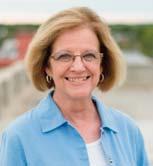

How did you experience your call to ministry?
Tim and I were a young couple with our first baby when we started with the MB family in a small church in Ulysses, Kan. People in the church were praying for us, and we felt the pretty hard tap of God at the national MB youth conference in 1983.
How has your view of that calling changed?
While Tim was at seminary it seemed that pastoral ministry was our calling. I was trained as an administrative secretary and had worked at Tabor College and seminary while Tim studied. When we landed back in Hillsboro to pastor at Parkview MB Church, I thought my calling was to be as a pastor’s wife and then I would have this job on the side. Over the years I have come to see it as a ministry and feel so blessed to be part of the ministry that encourages our pastors.
The word ministry may bring to mind gifts of preaching, teaching or worship leading, but for this minister in the U.S. Conference of MB Churches most of the ministry comes in the form of Shelby Church accounting software, Microsoft Word and Constant Contact Events. This year marks the 30th anniversary of Donna Sullivan’s ministry as administrative secretary and bookkeeper for the U.S. Conference.
What have been some high points for you?
When Chuck Buller was the executive director, we started the National Pastors’ Conference, and my job was expanded to include event planning. I would never in my whole life have dreamed I would be able to do something like that. It was way outside my box. But I love putting events together. There’s a lot of good resourcing and inspiration that happens at these events, and I love seeing people laughing and enjoying being together.
What do you see from your role that you want all of us to know?
From our first Sunday at Ulysses MB, Tim and I have loved the MB church. We love the theology, the focus on discipleship, we love the people. There are so many exciting things God is doing through this small band of people. I hesitate to say the word proud, but I am proud and excited and grateful to be a small part of it all from my little office in the corner of my basement.
InterviewbyKathyHeinrichsWiest
Caitlin looked up at me and softly said, “Thank you.”
I had just finished getting her water, preparing her food, getting her medicine, flipping the TV to a show I knew she would enjoy and making several trips between the couch where she spends most of her time and the kitchen.
She hesitated, and I could tell there was more.
“Can…can you bring me a napkin?” I trudged back to the kitchen. “Anything else?” I asked.
I heard a soft voice. “Maybe some Cheetos.”
Caitlin and I have been married for almost four years. She was diagnosed with congestive heart failure one month into our marriage. I’ve been providing care for four years and will likely be doing that for the rest of our lives together. Some days Caitlin does well, and you wouldn’t realize anything is amiss. At other times she struggles to get out of bed and barely makes it to the couch.
As her primary caregiver, I am with her for most of it. I grab takeout when my limited cooking skills are not up to the challenge. I pick up medicine, attend medical appointments, am with her at home on her worst days and still try to work as a full-time pastor. There are days where I feel like I can conquer any challenge and others where “can you bring me a napkin” almost breaks me.
Most of all, I spend a lot of time worrying. If I’m not there, what if something happens. I enjoy disc golf, cycling and a few other activities where I must leave Caitlin at home, but I
worry when I am not with her. Even having church meetings makes me nervous when I don’t get our usual “Hey dear, I’m doing fine” text.
If you are a caregiver, I’m guessing some of this resonates with you. It is a difficult journey, but one that following Jesus equips us for. After all, we were never designed to live life alone. As caregivers who are using our gifts to care for someone, we sometimes forget that others can also use their gifts to help care for us.
Peter says, “Each of you should use whatever gift you have received to serve others, as faithful stewards of God’s grace in its various forms” (1 Peter 4:10). Caitlin and I use an app called IANA Care (I Am Not Alone Care) to help send out requests for people to pick up medicine or even just spend time with Caitlin so I can go outside and take some time for myself. People want to help; they just often don’t know how. Give them the opportunity.
For those of you who are not caregivers right now, there are two things that can really help the caregivers in your life. First, let them know what you are willing to do. “How can I help” is helpful, but a friend saying, “If you need me to sit with Caitlin while you are at meetings, I’m available” is much more meaningful.
Second, don’t try to solve the caregiver’s problem with a story about your uncle’s neighbor’s third cousin. We have heard that story already, probably twice. Instead of giving advice, the best gift you can give is listening. And maybe some Cheetos.◗

Ben Friesen came to Cornerstone Community Church, Topeka, Kan., in 2017. Originally from Oklahoma, he moved to California to attend Fresno Pacific Biblical Seminary. He met his wife, Caitlin, while living in Fresno, and they were married in 2016. Friesen enjoys cycling and disc golf.
God was preparing me for something big
These past few years have been both the hardest and most fulfilling in my life as the Lord has set me on the path of healing from a long-term battle with anxiety. Although this process has been incredibly painful, it has left me with an unwavering faith in my God’s goodness and sovereignty and has given me a new appreciation for the freedom that Christ offers through the gospel.
I walked into January 2019 confident and filled with expectations for the new year. I had recently turned 21, I was a year into my marriage, and I had just taken big steps forward in my dream of acting in television and film. I couldn’t wait to see what 2019 had in store.
As I was spending some time with the Lord, reflecting on 2018 and praying about his will for the new year, my spirit could sense that God was preparing me for something big he wanted to do in my life. I remember saying that day, “Lord, I’m all in. I’m ready.” What I was unaware of at the time was that God was planning on putting me faceto-face with my biggest fears in order to heal some deep wounds in my heart.
My process of healing started when a friend helped me recognize I had an eating disorder. I had developed an unhealthy relationship with my body and food in my teens and for years have struggled with cycles of binge eating and restrictive diets. My friend helped me see that my broken relationship with my body was clouding my ability to see myself as who I was: a beautiful daughter of King Jesus.
The realization that I had an eating disorder hit me hard—I spiraled into a deep depression as I met with therapists and struggled to make sense of how to heal. For about seven months, I rarely left the house and gained about 70 pounds. I felt completely stuck and
helplessly lost. I had never before so deeply resonated with the lament passages of the Bible.
It was during these months that I witnessed first-hand the compassion of Jesus. In my hurt, I could feel Jesus sit and cry with me. There was a closeness that I experienced with him in this season that was really special.
My current stage of healing has come with the Lord opening my eyes to the fact that I have anxiety. I have always been an emotional person with high stress levels, but it wasn’t until I started having panic attacks in the winter of 2020 that I knew something bigger was going on. Pieces finally started to fit together as I was officially diagnosed with anxiety, began working with a therapist and started taking medication.
This was when I began to see the bigger picture of what God was doing in my life. There was something incredibly freeing about recognizing that the fear I felt everyday was not normal and was in no way what God wanted for me.
Today, I am still working hard to heal from anxiety and restore my relationship with my body and food. Although I did not expect my early twenties to look this way, I am so thankful that the Lord loves me enough to not leave me in my brokenness. I am nowhere near the end of the healing process, but even now I can say that the Lord is faithful, and his plan for me truly is a beautiful one.
If I could leave readers with one thing, it would be that God wants freedom for us today. This isn’t something that we have to wait for heaven to experience. I have gotten to see these past few years that when we say yes to what the Lord wants for us, the journey may be difficult, but it is worth it every time!◗

Carly Lepard lives in Denver, Colo., with her husband, Andrew. Lighthouse Church is their home, and the people there are their family. Lepard was the worship leader at Lighthouse for a season (she loves to sing!), and her husband currently heads Lighthouse’s digital media. Lepard is an actor and voice-over artist and has also spent the past three years developing a wedding videography business with her husband. On top of that, she is getting her degree online in Business Communication.



Self-care is a necessity when we are tired on so many levels
“I’m tired.” These two words echo in my head in this unusual season. When the pandemic first struck in March and we were sheltering at home, I heard people say it was time to pick up a new hobby, read the classics, learn to make sourdough bread. I was juggling three jobs—working as an interim pastor, therapist and seminary instructor—and scrambling to move all three professions to an online format. Thank goodness I learned to make sourdough bread during our years with Mennonite Central Committee because these days, I am too tired.
There are many reasons to be tired. We are tired of worrying about getting the virus or about it ravaging those we love. We are tired of being cooped up with family or feeling isolated sheltering in place as a single. We are tired of the demands of work or the uncertainty of unemployment. We are tired of racial, political and economic divisions in our country. We are tired of modified church experiences, not getting to serve others in familiar ways, of vacation plans being canceled and more.
Naming our tiredness and exploring the sources of our fatigue is a starting point. I believe that finding renewal in the midst of weariness comes from a clear call to love God, others and myself. Creating a rhythm of active engagement and sabbath rest can sustain us when we get tired.
Our lives have been turned upside down by this pandemic, and we see the suffering it has
caused those around us medically, financially and emotionally. We may already be familiar with Compassion Fatigue, when we become numb or indifferent to the suffering of others. Caring for others without also practicing self-care can lead to burnout. But that isn’t the only type of fatigue we encounter in fighting not one, but two, deadly viruses: COVID-19 and racism.
You may have read about Caution Fatigue, a term that appeared a few months into our long journey with COVID-19. Fear is a strong motivator, at least short term. Our fear causes us to rethink many daily decisions that used to require no effort, like grocery shopping or visiting our elderly parents. Our brains use a tremendous amount of energy on these decisions, especially when emerging medical information is confusing or inconsistent.
Our brains are not designed to stay in high alert for extended periods of time, so when Caution Fatigue sets in, we start to believe the threat is not real and stop following safety guidelines. Once we turn new safety practices into habits, we may feel less tired. However, the dangerous temptation will be to ignore the guidelines because it is too exhausting to navigate a balanced approach that cares for self and others with minimized risk.
The second deadly virus, racism, isn’t new to our nation. While people of color have long experienced the effects of individual and systemic racism, it has become newly visible to many of us. Blatant and brutal incidences of racism as well as daily experiences of being insulted, discounted or denied privileges can contribute to Racial Battle
By Cheryl Dueck Smith
Fatigue. Racial Battle Fatigue describes the fear and stress that a person of color may experience in the face of racial hostilities.
While walking with a friend, she described her heightened experience of feeling fearful in public, wondering if she will be confronted for being different. She shared the pain of feeling like an outsider, of not being accepted and living with the reminder that she doesn’t belong. It can be easy to start believing that something is wrong with her, she said, internalizing the racist stereotypes and accepting the lie that she is inferior. Carrying that level of fear and stress understandably
contributes to exhaustion, anger and avoidance. When my brothers and sisters of color say they are tired, I believe it.
As a person who benefits from being white, there is also a danger that my own fatigue will sideline me in the fight for justice and equality. Even though I may not agree with racism and find it incompatible with the kingdom of God, I may become overwhelmed with the magnitude of the injustice and succumb to White Fatigue. It starts by thinking racism is essentially personal and that I’ve sufficiently addressed my own individual racial attitudes. White Fatigue happens when I’m encouraged to address systemic racism found in the very fabric of our society, but it seems too complex. So I exit the conversation and wish we could talk about something else.
Learning about the impact of racism and engaging in personal

“Creating a rhythm of active engagement





. ”





“I find myself contemplating how
I can be grounded in sustainable practices that nurture love of God, others and self. ”



transformation, dialogue and action is hard work. White Fatigue is understandable but not an excuse. People of color in our communities are challenging their white friends not to fade away from the fight against racism after the initial marches and posts on Facebook. Addressing systemic change is going to take dedicated effort over time and can’t be abandoned at the end of the news cycle or when we hit roadblocks to change. Bowing out of the conversation because of White Fatigue is a privilege not afforded to those who are exhausted by Racial Battle Fatigue.
Care for self and others
Fatigue on so many levels makes self-care a necessity. For Christians, self-care is connected to care for others: Love your neighbor as yourself (Mark 12:31). Loving God and living in the experience of being loved by God forms the foundation for caring for others and myself.
I hold with compassion the pain of Racial Battle Fatigue that I do not experience myself. Knowing that Caution Fatigue and White Fatigue can wear me down, I find myself contemplating how I can be grounded in sustainable practices that nurture love of God, others and self. Pondering two questions has helped me stay engaged in ways that can both foster renewal and show sustained love for others.
Why am I doing what I am doing? If I follow Covid-19 safety guidelines only out of fear or because I am following orders, my motivation may plummet at some point. If I engage issues of racism in our country to avoid being called a racist or because it is trendy, those reasons will not sustain my effort over time.
However, if my love for God and others is central and my desire to participate in kingdom work is my focus, then I have a better shot at staying the course. Galatians
6:9-10 (CEB) is an encouragement and challenge: “Let’s not get tired of doing good, because in time we’ll have a harvest if we don’t give up. So then, let’s work for the good of all whenever we have an opportunity, and especially for those in the household of faith.”
The household of faith obviously includes our local congregations but also extends far beyond it to include my brothers and sisters across our city, nation and world. Because all are created in the image of God (imago Dei), we work for the good of all. Compassionate social engagement is a beautiful source of renewal because it allows us to be active rather than passive. The release of energy that comes from purposefully doing good is an antidote to fatigue.
Am I practicing sabbath rest? Fatigue sets in when I am not building rest and renewal into my routine. Isaiah 40:31 reminds us that waiting and hoping in the Lord renews our strength. Sabbath reminds me that I am dependent on God as my creator and sustainer. Kingdom work is God’s work into which we are invited to participate.
Sabbath rest can take many forms, and it is best when we nurture a variety of ways to be renewed. External and internal rest are both needed. We can reduce our stress and reset our brain with physical exercise and deep breathing. Surrounding ourselves with God’s creation quickly puts things in perspective. Meditating on Scripture or breath prayers center our body, mind and soul. Creatively connecting with others even while maintaining physical distance is possible via letters, texting and phone calls. Despite the gifts that come with connecting online, we might also add Zoom Fatigue to our fast-growing list of what makes us tired.
We will each need to develop strategies that work for us, recognizing that previous ways to engage in sabbath rest may no longer be helpful or possible. When my three jobs all moved home with me, I found the combination of worship music and a jigsaw puzzle allowed me to shut out competing demands and invite my mind, body and soul to reset.
Working for the good of all prevents me from becoming indulgent in my self-care. Sabbath rest provides a necessary balance to my active engagement. Without sabbath rest, I may begin to buckle under the burden that I was never meant to carry alone. Tiredness is understandable. It is also God’s loving invitation to finding a new balance of caring for others and myself.
Cheryl Dueck Smith began serving as the interim executive pastor at North Fresno MB Church, Fresno, Calif., in September 2019 and will conclude September 2020. She is a licensed marriage and family therapist at Link Care Center in Fresno and an adjunct faculty member and advisor at Fresno Pacific Biblical Seminary. Smith is married and has two sons.











































































IBy Jasmine Timm


spent a good chunk of last year worrying about all the ways I would encounter a snake while exploring the National Park System with my husband. I dreamt about snakes slithering under my tent as I slept. I replayed made-up scenarios about what I would do when a snake bit me. It was silly, really, but no matter how hard I tried to stop replaying images of snakes in my head, my body seemed to have a mind of its own and refused to give up the fight against snakes that easily.
I consider myself to be in the “anxious camp.” Research from the National Institute of Mental Health has found that about 19 percent of the adult population has experienced an anxiety disorder sometime in the past year. Anxiety is a prevalent issue for many Americans, and it’s an issue that the church cannot ignore, especially in our current global COVID-19 crisis.
In neurobiology, researchers have found that the emotions associated with anxiety tend to occur within the emotional centers of the brain, rather than the cognitive centers. This means that clinical anxiety is more of an automatic, emotional response rather than a pre-
meditated flow of thought. It is the body’s way of trying to protect us from harm.
The anxious brain perceives something in the environment, makes an automatic assessment of whether a certain thing is safe and then sends signals to the body to either ramp up or shut down. All of this tends to happen without consulting the “logical” center of the brain, so the anxious person is in a state of fear before they even know what happened to them. Our anxious responses are as natural to us as breathing.
The issue of anxiety can be seen as far back as Genesis 3. The narrative picks up after God finishes creating the good world and very good humanity he has envisioned. In this scene, we read of Eve’s encounter with the mysterious serpent, who famously says to her, “Did God really say...?” Eve is perfectly at peace with God, but the serpent slithers in to plant seeds of doubt. He questions whether God will really provide all that Adam and Eve need, and Eve buys in to the lie and takes matters into her own hands.
The result? Adam and Eve hide. In the narrative where sin is introduced into the world, we see a pat-




tern emerge — question God, distrust him, take matters into one’s own hands and experience fear. The act of distrusting God is sinful and results in much anxiety for humanity.
Thus, the Bible addresses anxiety. We see the reality of anxiety in the book of Joshua as God commands Joshua several times to not fear what lies ahead but to be strong and courageous. In the New Testament, Paul addresses anxiety when he tells us, “Do not be anxious about anything” (Phil. 4:6). Even Jesus covers the issue of anxiety, saying things like, “Do not worry about your life,” (Matt. 6:31) and, “Do not let your hearts be troubled and do not be afraid” (John 14:27).
Yet we run into a problem when we forget the larger context of these verses. God is not saying, “Just stop being anxious. If you have any anxiety present, you are a bad Christian.” Rather, God is acknowledging one of the painful realities of the fall: anxiety.
In the case of Joshua, we see God’s patience and his willingness to enter into Joshua’s anxiety by the sheer number of times God reminds Joshua to trust him. In Matthew 6, Jesus is telling his people that God meets them in their anxiety. They do not need to wonder whether their needs will be provided for, like the rest of the world often worries, because they know the Creator. When they experience anxiety, Jesus points them to the Father, who loves to care for the needs of his people.
In John 14, Jesus is encouraging his disciples to not fear what’s about to happen. They are about to watch Jesus die a gruesome death on a cross, and he is telling them to not let fear dominate their experience but to trust that God is providing something wonderful through Jesus’ death.
When Jesus addresses anxiety, he includes an encouraging reminder that he will be with us. He is the God who steps into anxiety and who reminds his people to trust him in the midst of their fear. He is reversing the anxious curse we see in Genesis 3 by inviting us to trust him. When we trust God to care for our needs, we don’t need to wonder, as Adam and Eve did, whether God will follow through on his promises. The remedy for anxiety is recognizing that God is with us.
He does not promise to put an end to all feelings of anxiousness but chooses to enter into it with us as we learn to trust him day by day. God loves to care for the needs of his flock, and he wants us to trust him with our anxiety as we experience it. With anxiety, it is not a matter of whether it is present or not, but whether we trust God to be who he says he is and do what he says he will do in the midst of that experience.
As Christians, we are in a constant process of growing into godliness (1 Peter 2:2). This means that we are also growing in trust. Knowing that God invites us to grow in trust, we can be patient with ourselves and others as we daily choose
to trust God, even when it’s a struggle. He equips us to grow into sanctification by the power of his Spirit, the power of his promises and the power of community. We may not be rid of our sins and weaknesses overnight, but we can learn to make it an automatic response to entrust our anxieties to him.
God’s response to anxiety
We can find deep, lasting encouragement and peace as we look to the God who enters into the human experience. He is Immanuel, “God with us” (Matt. 1:23). He is the God who stepped into human flesh, who was not ashamed to call us brothers and sisters (Heb. 2:11). He is the God who cares for us and asks us to place our anxieties on him (1 Peter 5:9). He is the God who calls us his “little flock,” who cares for our needs as a Good Shepherd cares for helpless sheep (Luke 12:32). And he is the God who fights for us, promising to always be with us wherever we go (Joshua 1:8, Matt. 28:20).


We can take God at his word that in Jesus he will continue to provide all we really need. We do not need to question or fear whether God will follow through. He always has, and he always will. We can take him at his word that there is nothing in heaven or on earth that can separate us from the love of God that is found in Christ Jesus — “neither death nor life, nor angels nor rulers, nor things present nor things to come, nor powers, nor height nor depth, nor anything else in all creation” (Rom. 8:38-39).

There is nothing in creation that we face, including anxiety, that can separate us from this profound love of God that is in Christ. Even as we experience stability slipping from our grasp, we can be certain that we have not slipped from God’s mind. The Lord has been kind to me in both small fears and complicated cycles of anxiety, and not even something as seemingly trivial as a fear of snakes can thwart God’s care for his sheep. In fears both big and small, in seasons of economic turmoil, job losses, untimely deaths and a virus that seems to loom over every facet of life, we can be sure that we have a strong advocate: Immanuel, God with us.
As we press toward Jesus in the midst of complicated emotions and uncertain circumstances, we can still say confidently with all the saints, “Come, Lord Jesus.” And he will come. You can be sure of it.
Jasmine Timm is completing her master’s in Clinical Mental Health Counseling at Western Seminary in Portland, Ore. After graduating, she plans on specializing in trauma counseling and hopes to use her degree to assist the church in supporting members who suffer from mental health issues. She currently works for the women’s ministry at her church in Eugene, Ore., assisting with Bible study development, teaching and writing. In her free time, she enjoys exploring the outdoors with her husband, Tyler, a special education teacher.







How we can support people who live with mental illness
People who live with a mental illness have been my teachers. I have learned a lot about life from what they model and say. Almost everything I have learned about how best to support them I have learned from them, and that is what I pass along to you.
By Irma Janzen
However, before we begin with those kinds of tips, let’s think a little bit about love and how that includes treating all people with dignity, respect and sensitivity. As Christians this is our starting place and let’s let 1 Corinthians 13 be our guide. I know that it is not always easy to treat people with dignity and respect, and this may be even more difficult when a person’s thinking is distorted, delusional or hallucinated because of an illness. The person may simply not be able to think rationally or logically, and if we have not experienced this ourselves it is hard to understand what that person is going through.
Willingness to learn is essential
First, be willing to learn about mental illnesses. Local mental health services, medical clinics and self-help groups have lots of resources. Articles, podcasts and many other resources are available on the Internet. Here are two places to start:
• www.mbwpg.cmha.ca/document-category/understanding-mental-illness,
• www.ourdailybread.org/conversations/grace-for-troubledminds-christian-perspectives-on-mental-health
Second, learn to listen and be willing to learn from the person with the illness. Listen attentively and without judgment. I do not know how the other person is feeling and I may not un-
derstand. I need to be the learner. I also need to listen to what may be under the words. I need to listen to the tone and observe. I need to be okay to sit silently, to see the tears or to hear a tirade of anger. I need to be ready to listen for a while. It may not be enough to give only half an hour while watching the clock.
Be quick to listen, slow to speak
Be slow to speak. I must not think I have the answers or that a quick, short, simplistic solution will be helpful. If and when I ask questions they need to reflect back to the person what he or she has said. Or I could ask open-ended questions to encourage them to say more. Comments like, “Tell me a little more about what you just said,” or “You said you were really feeling down” are examples of questions that can encourage further talking.
There may come a time when I encourage someone to find more resources or to try something, but that needs to wait until I have really heard and listened. Be careful of the attitude of “You can fix this if you just do this or that.”
There are times when it may be appropriate to divert the direction of the conversation. Continuing to listen to stories and incidents that repeat consistently may not be helpful. Some people can get very emotionally engrossed in talking about what they experience as reality through delusions or hallucinations. Changing the topic to another emotional topic may break the pattern and turn it in another direction.
Tips on being a good friend
One thing I still sometimes forget is that when we meet casually I need to say, “It’s good to see you” rather than saying, “How are you?”
Many people who live with serious mental illnesses have already been disappointed with people who seem to be really good friends for a while and then disappear. They don’t need more of that. However, you may need to pace yourself carefully so as not to over expend and then drop someone when you are exhausted. Agreeing on a next time to meet and putting it into our calendars is often good. In that way we don’t forget, but it’s also a way of setting healthy boundaries.
It is often helpful to gather a small circle of people who will all be part of the person’s life. No one person can meet all my needs, so I should not try to be the person who can meet all the needs of someone else.
Being remembered is important. A quick text to say, “I love you,” or a note saying, “I was thinking of you today,” or (if appropriate), “I am praying for you,” are quick ways of letting the person know that he or she is not forgotten.
Some people would enjoy a party for their birthday or being invited to a Christmas party. Some might prefer a one-on-one visit. It’s easy enough to ask what they prefer.
There are times to take a meal, do the laundry, offer childcare or go to an appointment.
It is also good to invite people to contribute with their gifts. I remember a woman who hand-drew beautiful bulletin covers. I know that was in the pre-computer days, but maybe some people would enjoy hand-drawn bulletin covers in 2020 too. That’s just one idea to start you thinking creatively.
Spiritual support is very important for Christians. When God seems far away, as sometimes happens when a person has a serious mental illness, some people want us to be praying with them. Others don’t. Some want a comforting Bible verse; some don’t.
Let’s never assume that because a person does not want prayer at a certain time that they are not in a solid relationship with God. Maybe their faith is even stronger and more
meaningful then mine. Maybe they are tired of platitudes when their prayers are cries and laments. It is appropriate to ask, “Would you appreciate a prayer or a Psalm or would you just prefer to sit in silence or to chat?”
The same caution applies to touch. Do we hug or shake hands? Ask. See what the person wants and go with that. People who have been hurt by touch may pull back if you seek to touch. Others are hungry for physical touch because they hardly ever experience it.
If we seek to be supportive and the person does not seem warm to our friendship or does not reply to a message, let’s not take that too personally. If we have made a mistake or done something unkind we need to apologize, but it may not have been a good day or there was a reason they couldn’t reply. Try again later.
As with any relationships, supporting and learning from people who live with a mental illness takes love, time and sensitivity. I already referred to 1 Corinthians 13. A metaphor that may be helpful is the one about the body in 1 Corinthians 12 where we have the idea of the faith community being one body and all of us significant members of that body. If some part of our body suffers we all suffer. If the whole body functions well and together we have a strong and healthy body.
While this article speaks specifically about supporting people with mental illness, we all need support, sometimes more, sometimes less. Let’s accept the gifts that people with mental illness bring to our community so that indeed we are one body and that people around us recognize us by our love for each other.
Irma Janzen has served in education, as the coordinator of Mennonite Central Committee Canada’s Mental Health and Disabilities Program and as a pastor. She is part of Fort Garry Evangelical Mennonite Conference (EMC) Church, Winnipeg, Man. This article was first published in The Messenger, the EMC publication and was included in a series published as part of EMC’s Mental Health Initiative 2018.
Studies show approximately one in four adults experience mental health issues, according to Tim Neufeld, associate marriage and family therapist with Zimmerman Therapy Group in Clovis, Calif.
The church is not exempt, as David Bruce Rose, associate professor of marriage and family therapy at Fresno Pacific Biblical Seminary, suggests: “Mental illness shows up at the church all the time.”
So, what should members of USMB congregations and pastors know in order to normalize “mental health” and promote well-being of self and others?
The concepts of self-care or soul care, according to Neufeld, are sometimes overlooked or ignored in Mennonite Brethren congregations.
“We get the ‘love your neighbor’ very, very well, but in collective communities like we are, we don’t do the individual work very easy,” says Neufeld. “I think this is why there’s especially a stigma (regarding self-care) in Mennonite Brethren populations and churches.… We really can’t love our neighbor best until we’ve taken care of ourselves.”
Creating awareness is an important first step in removing the stigma associated with the term “mental health,” says Maricela Chavez, associate marriage and family therapist and member of Iglesia el Buen Pastor in Orange Cove, Calif.
“Mental health can be defined as emotional, psychological and social well-being,” Chavez says. “People need to understand that mental health affects how we think, how we feel and how we act.”

David Bruce Rose, associate professor of marriage and family therapy at Fresno Pacific Biblical Seminary, teaches the popular course “Serving Resiliently in Crisis and Trauma,” which is a requirement for all FPBS master of divinity students. “Students, once they got in (the course), realized how important it was to address resiliency in themselves, resiliency in their church and how to deal with crisis and trauma within the church members and in the community and in themselves,” Rose says. Photo by FPBS
It is important for people to practice recognizing and naming their feelings and emotions in order to understand what is going on inside, Chavez says.
Neufeld echoes the value of an increased awareness of the inner life, saying the unconscious may surface in daydreams, thoughts, actions towards others, dreams or nightmares.
“That unconscious activity, which I think is real spiritual work that God does with us, tries to get our attention,” Neufeld says. “When we’re not attending to it, it shows up in forms that might impair us, like depression or anxiety, which are probably the two most common areas of mental health that people experience.”
A licensed MB pastor in the Pacific District Conference and former biblical and religious studies professor at Fresno Pacific University, Neufeld holds a doctor of ministry in church leadership and a masters in marriage and family therapy.
“There’s really two ways to look at mental health,” Neufeld says. “You can
see it with that stigma that’s very common, that something is really wrong with you, or you could reframe that as I like to do and say, ‘What a great opportunity to learn more about yourself and grow.’”
Neufeld, like Chavez, agrees the key to removing the stigma is to normalize mental health work.
“Everybody needs to do mental health work because we all lose touch with our soul,” he says. “Mental health work is spiritual work.”
The church is uniquely positioned to help when it comes to mental health issues and the holistic maintenance of body, soul and spirit, Neufeld says.
“(The church) has structure, it has support systems, friendship networks, leadership,” Neufeld says. “It’s got everything that we need, and yet it’s one of the most underused resources in American society.”
Larry Martens, former Fresno Pacific Biblical Seminary president and associ-
ate professor of practical theology, has done considerable work pertaining to congregational care from an Anabaptist pastoral perspective, although admittedly not pertaining specifically to mental health issues. A retired pastor, Martens is a member of North Fresno (Calif.) Church. He earned his master of divinity degree from FPBS and doctor of philosophy from Southwestern Theological Seminary.
In his article, “Anabaptist Theology and Congregational Care,” Martens promotes the idea of congregation as primary caregiver, with four levels of caregiving ranging from informal to formal, laity to pastoral to professional.
“We are not suggesting that we disregard the important and often essential role of the pastor or professionally trained caregiver in addressing needs within our congregations,” Martens says. “Rather, the congregation as primary caregiver affirms, validates and seeks to utilize the vast network of interpersonal relationships and expertise that exists within the congregation, which includes untrained laity as well as the professionally trained individual.”
The seminary’s Rose references Martens’ work in his course, “Serving Resiliently in Crisis and Trauma,” which all FPBS, master of divinity students are required to take.
“Research is very clear that social support is one of the best predictors of mental health, or recovery from mental illness,” says Rose, who earned his doctorate from the California School of Professional Psychology.
As an ordained Presbyterian pastor of 42 years, Rose’s call for the past 12 years has been to serve students at the seminary, where he is passionate about preparing pastoral students for ministry, informed by his own experience.
For example, while serving as a parish associate, Rose says he once was asked to teach a one-session adult education class on depression. So many people attended, the class had to be moved to the
sanctuary and offered for four weeks.
“All we had to do was open the door and people just flocked in,” Rose says.
Rose recommends the Mental Health First Aid (MHFA) program as a resource pastors can use to help people experiencing a mental health crisis. Just like an EMT is trained to deal with a physical problem before getting a patient to a doctor or hospital, MHFA trains pastors how to help and connect a person with treatment.
“I would suggest that (pastors), if they’re seeing mental illness, they make the referral to a professional,” Rose says. “But that doesn’t mean that this person doesn’t need pastoral care. They need that, too.”
Neufeld, too, recommends a partnership between pastors and therapists, encouraging pastors to view themselves as short-term care providers and therapists as meeting longer-term needs.
Pastors may also benefit from therapy.
“Pastors themselves are experiencing anxiety and depression and other issues at exactly the same rate as society, maybe even a tad bit higher because of the stress of their job,” Neufeld says. “Every pastor needs a therapist.”
One way the church can help, Chavez says, is by acknowledging that receiving mental health services does not equal a lack of faith or trust in God. Modeling transparency is key.
“Sometimes as Christians we might feel that we need to hide our true feelings and present to the world (and sometimes even to God) ‘a put together’ persona because we are afraid others will question our faith or our commitment to God and the church if things are not ‘picture perfect’ in our lives,” Chavez says.
The coronavirus pandemic has only added to the importance of monitoring inner emotions, Neufeld says, with the pandemic heightening people’s emotional responses, particularly anger.
“Anger is a primary emotion that always signals there’s something deeper going on, and I think the deeper issue that we’re all facing right now is fear,” Neufeld says. “A crisis like this is amplifying our fears, our worries, our anxieties—it’s all getting heightened. This is a really, really important time, both individually and collectively, to pay attention to those deep emotions that aren’t at the surface.”
Resolving conflict with others begins by knowing oneself, Neufeld says.
“As you’re gracious with yourself, you can be gracious to other people,” Neufeld says. “But you just can’t be compassionate to other people when you’re not compassionate to yourself.”
In his class at FPBS, Rose teaches a popular unit on “stewardship of self.”
“I like the idea of ‘stewardship of self’ rather than ‘self-care,’” Rose says. “I steward myself so that I can love my neighbor. If I don’t have adequate care for myself, if I don’t have the internal resources, then I’m not very good at loving my neighbor.” —Janae Rempel
If you had told Donna Sullivan, who for 30 years has helped to plan the U.S. Conference biennial conventions, that the 2020 convention—complete with speakers, testimonies, worship, prayer, communion, voting and leadership transitions—would successfully take place online, she wouldn’t have believed it.
“We actually held a convention online,” Sullivan said in an email after the final online session of the 33rd national
convention. “Who would have ever thought such a thing could be possible—and actually happen.”
USMB Gathering 2020, scheduled for July 21-25 at Stoney Creek Hotel and Conference Center in Independence, Mo., was cancelled June 1 due to the realities and restrictions of the coronavirus. Instead of traveling to the Kansas City area for the week, the 191 registered participants attended four webinars, opening and closing sessions and a business session via video conferencing in the comfort of their homes or offices.
“Doing a convention online is something we’ve obviously never done before, so I was thankful that it went so well,” says Don Morris, USMB national director in an interview after Gathering 2020 Online.
Morris and Sullivan worked with the USMB Leadership Board convention task force to determine what to provide online from the original schedule.
“We decided to use a limited number of previously arranged workshops as webinars for the online convention,” Morris says. “We selected four that we thought would be a balanced approach with a fairly broad spectrum of input.”
Online participants heard from two of the five Gathering 2020 plenary speakers—Boris Borisov and Kadi Cole, who were also scheduled to lead workshops—as well as two workshop presenters—Jon C. Wiebe and Ron Klassen—in a webinar format.
Borisov, lead pastor of Pacific Keep Church in Spokane, Wash., shared practical ways churches can increase engagement with their communities, aligning their unique strengths with opportunities to join God’s redemptive work in the world.
The key to church community impact is offering unique gifts in service, Borisov said, asking, “Does the community feel like there is a sacred presence in their neighborhood or in their city because of our church?”
In the second webinar, Wiebe, president and CEO of MB Foundation, explored ways churches can maximize generosity while growing strong disciples.
“Stewardship is an essential piece of discipleship,” Wiebe said, acknowledging that the realities of a global pandemic, racial concerns and economic issues have informed and changed the ways churches think about generosity and stewardship.
Wiebe focused on seven attributes of a generous church and recommendations for best practices while his colleague Bruce Jost shared related results of the recent MB Foundation survey of
USMB churches and their response to the coronavirus pandemic.
Klassen, executive director of Rural Home Missionary Association in Morton, Ill., shared strengths of small, rural churches and suggestions for maximizing impact by focusing on relationships.
“Our goal is to come to a place where we realize that our small size is not a problem that needs to be solved but a strategic advantage that God wants to use,” Klassen said, quoting author Karl Vaters. “Instead of being problem oriented, we’d do well to be strengths oriented.”
Speaking during Friday’s webinar, author, speaker and leadership trainer Kadi
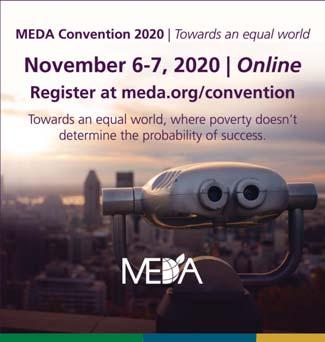
Cole discussed developing female leaders in the church based on her research.
Pulling from her book, Developing Female Leaders, Cole shared three of eight best practices for developing female leaders in the church, including seeking to understand women who desire to contribute, clearly defining what a church believes theologically to ensure alignment of church culture and developing a support system for leaders— men and women alike.
Webinar attendees were encouraged to make comments and ask questions verbally during the presentations and using the chat feature that is part of Zoom, the conferencing platform used for Gathering 2020 Online. The chat feature also made it possible for presentations to be translated into Spanish.
Business session highlights
The business session was also held via Zoom, with 98 registered delegates. Moderated by Leadership Board chair David Hardt, the agenda included elections, a financial report and brief reports from nine ministries. Report booklets were mailed prior to the convention; written reports are posted on the USMB website.
Oral report highlights included an announcement from Kyle Goings, chair of USMB Youth, that the every-four-year national youth conference is being discontinued, and a national summer camp will be a new annual national event for high school students. Jon Wiebe, MB Foundation president, announced the expansion of the foundation’s Fresno, Calif., office to include new staff members Marlin Hiett and Nathan Yoder, who will begin in September.
Morris reported that a review of the culture and leadership of Multiply, the North American MB mission agency, conducted by a joint U.S./Canadian task force is nearing completion.
Open, closing worship sessions
While time constraints meant Gather-

ing 2020 Online was not able to accommodate everything on the original schedule—including MB Foundation’s 75th anniversary dinner celebration and the Mennonite Central Committee 100th anniversary reception—times of worship were included.
The opening worship session was pre-recorded and posted on Facebook Live and YouTube. “Pre-recording allowed us to put it on platforms that can handle that kind of service without glitching… and allow people to interact,” Morris says.
The opening session featured Aaron Hernandez, pastor of two Texas congregations, Grace Point at Grulla and Grace Point at McAllen. Alternating between Spanish and English, Hernandez preached on what holds back a follower of Jesus from increasing their
impact in the world. Hernandez challenged his listeners to “slay your significance monsters.”
Hernandez said, “Before God wants to use any person in a significant way, he calls men and women to slay their significance monster. In the kingdom of God only one interest matters and that’s the heart of God.”
Hernandez encouraged his listeners to daily embrace the will of God. “To die to self so that Jesus can live through us, that’s where maximum impact comes,” he said.
Holding Gathering 2020 online did not alter the usual practice of closing the convention with communion.
Attendees supplied their own communion elements for the service.
The closing session also included a church planting update that incorpo-
rated testimonies from church planters Christian Kohs and Phil Wiebe. — Connie Faber and Janae Rempel
To read an extended report, visit www.christianleadermag.com. All Gathering 2020 Online events and LEAD Pods recorded by plenary speakers Kadi Cole, Nzuzi Mukawa and Rob Reimer are available on the USMB website (https://usmb.org/).
Low attendance prompts end of YouthCon
Climbing a mountain requires effort. But reaching the summit offers a reward—the view makes the difficult journey worthwhile.
Using similar climbing language, USMB Youth has announced a new annual national summer camp called Ascent, designed to be the gathering place of U.S. Mennonite Brethren youth.
The announcement marks the end of YouthCon, the once-every-fouryears national youth event. As a result of a steady decline in attendance, USMB Youth leadership deemed YouthCon unsustainable, closing a chapter spanning 44 years and including 12 national youth events. However, when one journey ends, a new one begins. For USMB Youth, that journey is Ascent, coming in June 2021.
The Ascent promo video, first viewed by attendees of USMB Gathering 2020 Online in July, says: “We believe that the ascent to camp will lead to a very special place of intimacy with Jesus. We desire to gather together as a family of believers to worship God in community while personally stepping into deeper
places of God’s unique callings, plans and purposes for our lives.”
The history of the USMB National Youth Conference (NYC) dates back to 1975, when the inaugural NYC took place in Glorieta, N.M. NYC was held in Estes Park, Colo., for six of the following seven events, then moved to Anaheim, Calif., in 2007. A service project element was added, and two more urban environments followed—San Antonio, Texas, in 2011 and Denver, Colo., in 2015.
Following Named 2015 in Denver, the National Planning Team rebranded as USMB Youth, NYC became YouthCon, a new Youth Worker Network was added to connect and resource youth
workers across the conference and Project:Serve, grants to support youth group community projects, was introduced. YouthCon 2019 returned to a camp setting in Glorieta. Despite efforts to increase participation, attendance reached an all-time low of 688. Kyle Goings, USMB Youth chair, notes that while the same number of churches (38) attended Named 2015 as attended YouthCon, numbers had decreased by more than 120, continuing a 20-year trend of decreased participation.
Attendance at a national youth event peaked at 1,796 participants in 1999 and first dipped below 1,000 in 2011.
USMB Youth leadership identified eight reasons for the decline in atten-

dance. Goings highlighted four primary reasons in his USMB Gathering 2020 report.
■ The frequency of YouthCon every four years—once a draw as a “once-ina-lifetime” opportunity—has become a hindrance in a culture with a short news cycle.
■ The average youth worker tenure at an MB church is about two years, creating a disconnect between YouthCon events.
■ Missing school has become increasingly difficult for families.
■ A growing number of churches no longer value meeting together as a national conference on a youth level.
“We basically came to the conclusion that YouthCon in its current form is un-

sustainable,” Goings says.
USMB Youth recommended to the USMB Leadership Board last fall that YouthCon be discontinued in its current form. The Leadership Board approved the recommendation.
“It just hits me in the gut to think that YouthCon won’t happen again,” says Goings, who is the youth pastor at First MB Church in Wichita, Kan. “This has been my love and passion—besides youth ministry in the local church—for almost 12 years now. It wasn’t an easy decision, but sometimes you have to make the right decision no matter how bad it feels.”
Thinking outside the box
Because USMB Youth sees value in









national youth gatherings, discontinuing YouthCon has provided for the start of something new.
“At the same time, running parallel to this evaluation of YouthCon was the Southern District summer camp for high school students,” says Goings, who is also a member of the Southern District Conference Youth Commission (SDC YC).
Because the SDC Senior High Camp (SHC) had outgrown its current location in Westcliffe, Colo., with an average attendance of 300, the SDC YC began looking into the possibility of hosting its summer camp at Glorieta, N.M.






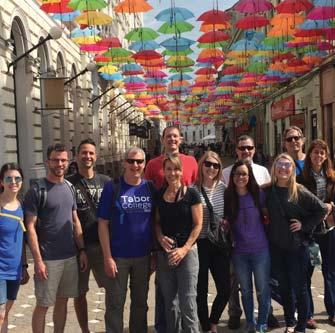
That’s when Goings and others thought outside the box. With a facility that could accommodate thousands, national and district youth leadership began looking into combining the two events—utilizing the national identity that USMB Youth brings and the established resources of the Southern District—to introduce a new camp for all USMB youth.
The SDC YC met for prayer and discussion over six months, initially planning for 2020 to be a test pilot for the new annual national summer camp. But the coronavirus pandemic halted those plans.
However, USMB Youth and the SDC YC are moving forward to host Ascent in Glorieta, N.M., in June 2021. Registration is expected to begin in late fall or early winter 2020.
“Ascent doesn’t replace YouthCon, but the spirit of it will still continue on,” Goings says. “That gives me hope.”
Although USMB Youth and the SDC YC are partnering to offer the national summer camp, which will happen in place of the SDC SHC, Goings emphasizes that Ascent is not simply an expanded SHC.
“One thing is clear—it’s not the Southern District inviting the other districts to their district camp,” Goings says. “This is a whole new entity.”
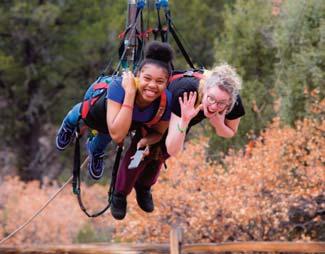
As USMB Youth plans for Ascent, Goings says they are recruiting volunteers and welcome participation from all districts. Current members of USMB Youth include Goings, Russ Claassen, Southern District youth minister from Newton, Kan., and Ben Wheeler, youth director at Birch Bay Bible Community Church in Birch Bay, Wash., in addition to representatives from MB agencies and institutions.
Leaders chose the term “Ascent” to incorporate the picture of overcoming challenges when climbing to a summit, Goings says, describing the value for students as worshiping God in community and increased intimacy with Jesus. Whether by incorporating more students on stage or through strategies of games and activities, the goal is connection—to God and each other.
Ascent addresses three hindrances to YouthCon attendance. Ascent will be
held during the summer, meaning students will not have to miss school. A June camp also means that Glorieta Adventure Camps will offer an expanded list of 55-plus activities, including waterfront activities, as opposed to the 30 available during YouthCon in April. An annual event will maintain momentum, Goings says, and financial costs will decrease due to different programming needs.
“(Ascent) will have that YouthCon flair and excitement,” Goings says, “but we are going to be very intentional that we can’t compete with the big conferences and big speakers and bands.”
As the YouthCon chapter closes, Goings celebrates its 44-year history, over which nearly 14,000 people attended.
“I would love for people to look back at their experience at YouthCon in the past with a sense of fondness, a sense of
godly joy, that it was a spiritual marker in their lives,” Goings says.
USMB Youth is also planning for the addition of the National Leadership Pipeline (NLP) program, a coordinated effort by MB agencies to identify and invest in future leaders. NLP will create a leadership pool for churches and organizations to both contribute to and draw from when identifying and seeking leaders. USMB Youth is planning a test pilot run of an internship program in the summer of 2021.
Goings is excited by the potential for leadership development thanks to Ascent and the NLP.
“I would love to hear stories where we saw students feel called to ministry, we poured in and invested in them and then they spent decades pouring back into MB churches,” Goings says. “And thousands of people are impacted because a few people sat down and said, ‘How can we invest in our potential future leaders?’” —Janae Rempel
Family events, virtual VBS among options offered
Continuing concerns surrounding COVID-19 forced USMB churches to rethink traditional plans for vacation Bible school this summer, and many chose to offer alternative events.
For most churches, planning for VBS began early in the year, before the coronavirus had begun to alter daily life. By the time states began implementing restrictions in March, many churches already had their VBS plan in place.
Despite the challenges, organizers believed in the importance of offering some kind of activity to give kids something fun to keep them engaged with their church family.
With summer still months away, churches like Community Bible Church
in Olathe, Kan., decided to hold off for a while on making any final decisions.
“VBS is such a wonderful outreach program for us, and we wanted to do something for the kids since they’d been stuck at home for several months,” says Mandy DeWitt, co-director. “We kind of were hanging onto hope that we would still be able to do that.”
However, by mid-May the decision was made to cancel plans to use Group’s “Rocky Railway” VBS and pivot in a new direction. The kids’ ministry team at CBC selected a new curriculum called BOLT, which was specifically tailored to be offered virtually.
“The biggest decision-making factor in trying to decide which one to do was, we wanted parents to be engaged with their children,” says DeWitt.
“We were trying to find a curriculum that would foster parents serving as that disciple-maker.”
Volunteers supplied each child with a packet containing craft supplies, snacks, components for games and a note for parents. Families picked up their packets drive-thru style at the church, and then the ministry team sent a daily email June 2-4 with a video containing the lesson and music for the day.
Zoar MB Church, Inman, Kan., also went the route of offering a virtual VBS. Zoar has partnered with other churches for an Inman community VBS for many years. These churches had also planned to use the Rocky Railway curriculum and decided to go ahead with this theme when Group revamped the program to provide an online option.
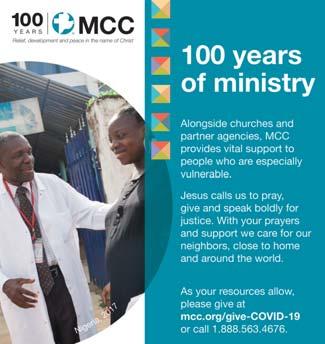
“They walked you through how you could do a virtual presentation of their curriculum,” says Melissa Funk. “We decided to pursue it that way and see if some of our volunteers would be willing to videotape their segments.”
Volunteers created a YouTube video for each of the five days of VBS, held July 12-16. Different segments were recorded either at Zoar MB’s building or in a volunteer’s home. The Inman churches also created packets for families to pick up, and to kick-off the event, they included a boxed supper grilled by the volunteer fire department.
“When we started doing the pickup I got a little teared up, because it wasn’t supposed to be that way,” says Funk. She says it was a challenge “not having the kids’ energy, of getting to see their
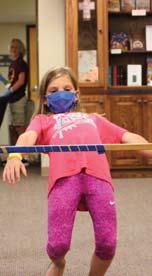

faces and the excitement of it all” while making the videos.
However, the virtual VBS did open up a new opportunity to reach kids beyond the Inman community. Funk explains that the videos made VBS accessible to children outside Inman whose own churches may have cancelled VBS and not been able to offer alternate events.
Other churches opted to still offer inperson events with a different format, usually outdoors to allow for more social distancing.
Diana Zuercher says the planning team at Koerner Heights Church in Newton, Kan., pulled materials from a past year’s VBS to create a one-time family night called Treasure Quest 2020. Leaders encouraged interaction to stay primarily within family units as attendees participated in a meal, songs, lesson time and a treasure hunt, all held in a local park.
Attendees of another family fun night held at Living Hope Church in Henderson, Neb., brought their own picnic
meals and ate in family units while participating in Bible trivia in the church’s Family Center. The festivities then moved outside for a game of slip-andslide kickball.
Joanne Haidle says the fun night allowed for all ages to participate, if they were comfortable, while keeping the gathering smaller than a typical VBS, which usually attracts around 120 kids from the community.
North Oak Community Church in Hays, Kan. offered three family VBS nights throughout July.
“In trying to think outside the box, we decided to have three nights, but change the format to be able to social distance and allow parents to attend too,” says Karen Rigler.
Some churches that opted to wait until August to hold events continued to deal with changing restrictions and information as the summer went on.
Kingwood Bible Church in Salem, Ore., planned an outdoor family event for August 23 that would allow them to follow state safety guidelines.
“The event is rather simple, and perhaps growing a bit more simple as we get closer,” says pastor Nathan Ensz in late July. “Restrictions in Oregon are tightening up rather than loosening; yet it seems we still have the go-ahead to pull this off.”
The event is planned to include a free meal and activities such as mini-golf, Frisbee and painting and a gospel presentation.
“We want to remind our neighbors that we are still here and trying our best to follow guidelines and yet keep the mission of the church alive and well,” says Ensz.
Parkview MB Church in Hillsboro, Kan., planned an outdoor family fun night in August for its congregation to try to limit the gathering size, and also partnered with two other Hillsboro churches to offer a joint virtual VBS.
Parkview, Ebenfeld MB Church and Grace Community Church, with help from Hope Community Church of Andover, Kan., gave children in Hillsboro the opportunity to participate in VBS at home July 27 through August 11.
Churches are largely hoping to return to their traditional, in-person VBS format next summer, if they are able. The experiment in alternate events has opened the door for new ideas, however.
“Next summer, we hope to have our VBS in early June again with tons of kids,” says North Oak’s Rigler. “Although, we have learned the value of family nights and I wouldn’t be surprised if we continue having family nights throughout the year in the future.”
Funk says she would love to see videos of Inman’s community VBS continue to be offered online so it can reach a wider audience.
“How is God going to use this? That was always the question,” says Funk. “It was a neat opportunity to watch how God did use it.”—Jessica Vix Allen
Cohorts, coaching equip pastors, leaders
Heading into the fall ministry season, we’re spotlighting two USMB initiatives—LEAD Coaching and LEAD Cohorts.
For the past three years, USMB has provided LEAD cohorts.
LEAD Cohorts are online meeting places, via Zoom, for small groups of MB pastors and leaders or anyone interested in learning more about a specific topic, gathering together with like-minded people for up to 12 participants plus the leader. Another round of cohorts begins the first week of September.
“LEAD Cohorts are awesome,” says Christian Kohs, church planting pastor of Redemption Church in Owatonna, Minn. “They provide a place for people in our MB family to lean into each other— whether for prayer, encouragement or even practical ministry advice. Cohorts truly provide a place for our local churches to be strengthened so that the gospel can move forward in our cities.”
LEAD Cohorts are free to all participants. The only cost is for books or materials, if recommended by the cohort leader.
LEAD Cohorts typically last three months and meet online every two weeks for 60 to 90 minutes. Signups, through USMB administrative assistant, Janae Rempel at admin@usmb.org, are still possible through the first two weeks of September.
One cohort leader says, “I enjoy the camaraderie of relationships in
the cohorts I lead, especially as we dive into greater awareness in a number of areas. I offer a contemplative approach as a pause on our busy lives; where we can explore a number of topics and grow forward together with resources and encouragement.”
A list of cohorts to choose from and information about them can be found at usmb.org/leadcohorts/.
Another key LEAD initiative is LEAD Coaching. Coaching is an intentional, ongoing life-on-life relationship that empowers the person being coached to realize their full potential, purpose, confidence, courage, joy and vocational accomplishment.
There are few things more helpful for pastors and leaders than having a coach who accepts you unconditionally, believes in your potential, actively listens to you, keeps you accountable and works diligently for your success.
Ed Boschman, previous USMB executive director, now serves as the LEAD Coaching head coach. In a recent email he wrote, “Powerful questions as part of the right relationship will get you unstuck and out of malaise. And faithfulness to our kingdom missional opportunities is after all what’s required of us.”
The coaching process involves exploring where a leader currently finds themselves in life and ministry and then creating a map to getting where they want to be. A major component of the coaching process is one’s own personal insight. Coaches are skilled at intuitively listening,
asking powerful questions, defining goals, helping develop relevant action plans and providing the accountability/support for leaders to succeed.
“Experiencing coaching is a life asset,” says Chandelle Claassen, a LEAD Coaching coach. “What a gift to have accountability and encouragement while pursuing dreams and working toward wholeness of self. Coaching can help identify your growing edge and stretch your growth in those areas aligning your identity to your call in God’s kingdom.”
Don Morris, USMB national director, would like to see many more MB leaders take advantage of this extremely helpful coaching relationship. “I believe coaching helps pastors serve their church at a higher level, so I also wish more churches would help provide this opportunity for their pastors and ministry leaders,” he says.
For more information about LEAD Coaching contact Ed Boschman: evboschman@gmail.com.
USMB
My COVID-19 adaptation in April and May was to work partially from home—writing file descriptions, scanning photos, editing encyclopedia articles, responding to email queries and updating the websites I manage for the Mennonite Brethren Historical Commission. Even though the Winnipeg archives was closed to the public, I still went in a day or so each week; because I work alone, physical distancing was not difficult. At the time of this writing, the archives is open by appointment to researchers.
The year 2020 is turning out to be apocalyptic in the biblical sense of “revealing” much about our times, institutions and social arrangements. COVID-19 is revealing strengths, weaknesses and gaps in our various communities—religious, professional, educational, familial, municipal, political, etc. For all of us, COVID-19 is providing an opportunity to review the narratives we have chosen to characterize our lives and relationships.
One of the things I enjoy about my job as keeper of the archives is helping people with their research queries. Many come to the archives with enquiries that are quite personal, queries that have to do with identity formation. They could be looking for a baptism photo, an obituary of a loved one, a book, a magazine article or a church decision on some theological issue. They are looking for some documentary evidence to help them construct or reconstruct meaning: Who am I? Where do I come from? Why do I think this way about these sorts of things? Whether you have a Mennonite heritage, or it is your chosen faith tradition or both, an MB church archive is a great place to explore these questions.
The COVID-19 lockdown could be the occasion to dig into these identity questions that have been at the back of your
mind for some time. Even though you may not be able to get to one of the MB archives (Fresno, Calif., Hillsboro, Kan., Abbotsford, BC, or Winnipeg, Man.), the Anabaptist-Mennonite online resources available for historical research are extensive. I have five to suggest.
Recently, I finished scanning the 112 images in the John M. Schmidt photo collection. Schmidt (pictured below) is one of the early MB radio broadcasters that David Balzer wrote about in the lead article of the March 2020 Mennonite Historian, now online at (1) the Mennonite
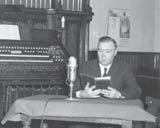
Historian website, www.mennonitehistorian.ca/. This website is searchable and houses over 40 years of the quarterly magazine. And those 112 photographs are now viewable online at (2) the Mennonite Archival Information Database (MAID) website, https://archives.mhsc.ca/john-mschmidt-photograph-collection-2, a collaborative effort of 14 Mennonite archives, curating thousands of images.
I also edited a biography of Schmidt for posting to (3) the Global Anabaptist Mennonite Encyclopedia Online (GAMEO) website, https://gameo.org/index.php?title= Schmidt,_John_M._(1918-2008), and
See VANTAGE POINT, page 30

Jon Isaak serves as keeper of the MB archives in Winnipeg and executive secretary for the MB Historical Commission, a ministry of both U.S. and Canadian MB churches. Email him with your question at jon.isaak@mbchurches. ca, and he will connect you with the MB archives that can best respond to your question.
BAPTISM/MEMBERSHIP
Mike Petts, Diane Petts, Christian Kohs, Erica Kohs, Calvin Kohs, Hudson Kohs, Tim Gullickson, Heather Gullickson, Heather Turek, Talon Turek, John Maloney, Caris Maloney, Sara Maloney, Steven Broad, Judy Broad, Colby Reich, Destiny Reich, Zayleigh Reich, Tyler Reich, Trynity Reich, Kali Keller, Steven Keller, Lincoln Keller, Rylynn Keller, Linda Dewey, Jayson Teichroew, Spring Teichroew, Preston Teichroew and Noah Teichroew were received as members at Redemption Church, Owatonna, Minn., Aug. 2.
Tiffany Cervantes, Melissa Marshall, Jared Miller, Keith Novak, Isabella Dollard, Sophia Dollard, Ronald Dautschi, Michael Mills, Jason Hart, Halo Hart, Sidney McNeil, Rick Massey, Melanie Hansen, Ryder Long, Rylee Long, Megan Ortiz, Kat Walker and Iris Shepherd were baptized July 26 at South Mountain Community Church, St. George (Utah) Campus
Jaida Klanchnik, Eric Klanchnik and Alissa Guthrie were baptized at Bethesda Church, Huron, S.D., July 12.
Leonard Barajas, Audrey Bergen, Kathy Ford, Grace Isaac, Isaac Mack and Daniel Neufeld were baptized at North Fresno (Calif.) Church. Each baptism was recorded as it happened in private pools around town and celebrated in an online service July 5.
John Dube and Kate Dube were received June 28 as members at Rosedale Bible Church, Bakersfield, Calif. Patricia Dube was received as a member Aug. 16.
Anita, Jess and Tina were baptized at Renewal MB Church, Rapid City, S.D., June 14.
Andrea Mies, Bo Kyaw, Faith Jensen, Ashten Pomerico, Dawn Gortmaker, Dawn Kleinsasser, Ryan Pomerico and Tricia Metcalf were baptized May 31 at Bethesda Church, Huron, S.D
Dustin Maddox began serving as lead pastor at North Fresno (Calif.) Church in September 2020. Stacie Winckler concluded her service as interim youth administrator, and Jason Kinzel stepped into the role.
Michael Beye concluded his service as worship minister at Buhler (Kan.) MB Church, Aug. 16.
John Oelze concluded his service as executive pastor at First MB Church, Wichita, Kan., Aug. 5.
Mike Unger began serving as senior pastor at Madera (Calif.) Avenue Bible Church in July. Youth pastor Robert Ross began serving as associate pastor. Former pastor Jim Kennemur has retired.
Diana Zuercher concluded her service July 17 as director of Children’s Ministries at Koerner Heights Church, Newton, Kan.
Michael Rondon began serving July 1 as high school pastor at Neighborhood Church, Visalia, Calif.
Robert Adorno began serving as associate pastor of spiritual formation at Lighthouse Church, Denver, Colo., after Shayna Laing concluded her service in that role.
Reuven Isaac concluded his service as interim director of worship and technology at Hillsboro (Kan.) MB Church.
Correction from July/Aug.: Seibel, Ronald Dean, Wichita, Kan., USMB pastor for 34 years, serving churches in Yale, S.D., Henderson, Neb., Freeman, S.D., and Mountain Lake, Minn., and also serving as Central District chair, member of First MB Church, Wichita, April 19, 1939—May 4, 2020. Parents: Herbert and Bertha Seibel. Spouse: Katherine Dockter. Children: Karis Schroeder, Bryan; four grandchildren, one great-grandchild.
Allen, Earl Jr., Minot, N.D., Bible Fellowship Church, Minot, April 13, 1920—May 23, 2020. Parents: Ernest and Desdamona (Davisson) Allen. Spouse: Ethel Mae Baldus (deceased), Wylma Sund (deceased). Children: Dee Ann, Donna Barto; step-children: Tim Knutson, Brad Fimrite, Andy Fimrite, Ida Landers; one grandchild, eight step-grandchildren. Braun, Karen, Reedley, Calif., member of Reedley MB Church, Oct. 9, 1945—July 7, 2020. Parents: Fred Jr., and Adele (Ericcson) Ostrom. Spouse: Terry Braun.
DeForest, Lola Mary, Olathe, Kan., Community Bible Church, Olathe, July 29, 1929— June 21, 2020. Parents: Edwin and Juanita (Bloyd) Carswell. Spouse: Merle Eugene DeForest (deceased). Children: Marvin, Allen, Bernice Averill; six grandchildren, six greatgrandchildren.
Friesen, Edmor, Reedley, Calif., member of Reedley MB Church, May 31, 1931—July 21, 2020. Parents: Jacob P. and Tena (Goertzen) Friesen. Spouse: Thelma Friesen. Children: Philip, Kenneth, Brian, Janice Sanders; 10 grandchildren, 12 great-grandchildren.
Friesen, John J., Denver, Colo., member of Mosaic (formerly The Rock Community Church), Littleton, Colo., Oct. 28, 1932—Jan. 28, 2020. Parents: John J. and Tena Martens Friesen. Spouse: Luella “Lou” Henne. Children: Vicki Renninger, Jodi Murray, Jeff; five grandchildren, six great-grandchildren.
Frueh, Marlowe, Reedley, Calif., member of Reedley MB Church, June 3, 1938—July 9, 2020. Parents: Herbert and Luella (Graumann) Frueh. Spouse: Lila (deceased). Children: Karen Bennett, Bryan; five grandchildren, five great-grandchildren.
Groening, Irma June, Hillsboro, Kan., member of Hillsboro MB Church, June 2, 1925— March 4, 2020. Parents: C.R. and Martha (Funk) Duerksen. Spouse: Howard Dean Groening (deceased). Children: Jerry, Gordon; five grandchildren, 11 great-grandchildren, two great-great-grandchildren.
Harder, Marion E., Shafter, Calif., member of Shafter MB Church, Nov. 10, 1931—July 5, 2020. Parents: John and Helena Thiessen. Spouse: Ray Harder. Children: Dorothy Richardson, Debra Moore; five grandchildren, 11 great-grandchildren, 10 greatgreat-grandchildren.
Haupt, Richard Eugene, Madera, Calif., ember of Madera Ave. Bible Church, Oct. 14, 1933—July 20, 2020. Parents: Gottlieb and Katherine Haupt. Spouse: Betty Lou Haupt (deceased), Dudy Lue Haupt (deceased). Children: Ron, Jeanie; two grandchildren.
Hiebert, Gordon Keith, Hillsboro, Kansas, member of Hillsboro MB Church, May 13, 1950—April 18, 2020. Parents: Otto and Bernice (Neufeld) Hiebert. Spouse: Judy. Children: Ashley Sheridan, Robyn Neese; four grandchildren.
Janzen, Alice, Reedley, Calif., member of Reedley MB Church, Oct. 26, 1921—July 6, 2020. Parents: Dietrich and Mary (Janzen) Friesen. Spouse: Rev. Henry L. Janzen (deceased). Children: Davey (deceased), Ken, Stan, Mark; five grandchildren, nine greatgrandchildren.
Janzen, Judy, Reedley, Calif., member of Reedley MB Church, Nov. 30, 1933—June 1, 2020. Parents: Frank H. and Agnes (Driedger) Pauls. Spouse: Franklin Janzen (deceased). Children: Paula Friesen, Bill (deceased); four grandchildren.
Kleinsasser, Donald Lee, Huron, S.D., member of Bethesda Church, Huron, July 5, 1947—June 17, 2020. Parents: Edwin and Ruby (Wipf) Kleinsasser. Spouse: Jane Bigelow. Children: Kristi Lewis; one grandchild.
Leporati, Diane, Hanford, Calif., member of Reedley (Calif.) MB Church, Dec. 6, 1962— May 18, 2020. Parents: Ray and Anita “Toots” (Ryan) Leporati. Spouse: Javier Quijano (deceased). Children: Eric Mayhew. Penner, Margaret, Reedley, Calif., member of Reedley MB Church, June 23, 1920—May 25, 2020. Parents: Henry and Elizabeth (Boldt) Peters. Spouse: Eldo Klassen (deceased), Gus Penner (deceased). Children: Bob Klassen, Don Klassen (deceased), Betty Reimer, Eldora Kroeker (deceased), Donna Clay, Danny Penner (deceased); 17 grandchildren, 38 great-grandchildren, 17 great-great-grandchildren.
Rosedale, Ralph, Dinuba, Calif., member of Reedley (Calif.) MB Church. Parents: Selmer and Margaret (White) Rosedale.
Spouse: Pauline. Children: David, Barbara, Margaret (deceased); three grandchildren, one great-grandchild.
Siemens, Marjorie Dell “Marj,” Shafter, Calif., member of Shafter MB Church, Oct. 21, 1931—June 18, 2020. Parents: Millard and Mable (Myrick) Hugo. Spouse: John E. Siemens (deceased). Children: Gary, Pamela Garcia, Jonathon (deceased); 16 grandchildren, 23 great-grandchildren, two great-great-grandchildren.
Pastors Tony Petersen and Aaron Garza host a new podcast created by Mountain View Church, Fresno, Calif.
Bethesda Church, Huron, S.D., held a church camp-out at Lake Thompson State Park July 30-31.
Stony Brook Church, Omaha, Neb., hosted a Community Outdoor Picnic June 20 following social distancing guidelines. Guests were invited to bring their own blankets, chairs and picnic meal. The church provided Communion take-home bags for families and Kid Life packets for children. Neighborhood Church, Visalia, Calif., distributed free BBQ lunches for fathers via drive-thru pickup June 21. The church encouraged people to make short videos saying why their dad is the “best dad ever.” The church delivered special Father’s Day
Willow Avenue Mennonite Church, Fresno, Calif., joined the national anti-racism conversation sparked by the killing of George Floyd and other acts of police brutality when it created a mural of signs on the fence of its property.
In a letter to the congregation, pastor Audrey Hindes described the protests and rallies as an “important moment in the history of our country” and wrote that the impromptu mural created on the fence outside the White House in Washington, D.C., inspired her to invite congregants and community members to create something similar.
“Predominantly white churches like ours must not be silent,” wrote Hindes. “Our theological claims and values for social justice demand that we stand with our sisters and brothers of color.”
Members of the church and the community brought their posters and signs to the church June 19. Zip ties were available for participants to attach their contributions to the fence. As they were installing the display, people in passing cars shared their affirmation. The 69 posters were on display through the end of June. —CL
treats to all featured dads. The church had free pizza in the parking lot July 28.
Faith Bible Church, Omaha, Neb., held an all-church cookout with games and fireworks July 4.
Faith Bible Church, Omaha, Neb., held three nights of Worship in the Park on the second Sunday of each month during the summer.
Redemption Church, Owatonna, Minn., held an “Easter in August” celebration with two services Aug. 16 including baptisms, welcoming of new members and a bounce house. The service was broadcast on radio and television. The church’s original plans for Easter were postponed because of the coronavirus.
Axiom Church, Peoria, Ariz., held a come and go open house with free burritos and coffee and acoustic worship Aug. 2 to celebrate the church’s seventh birthday.
North Fresno (Calif.) Church provided supplies for a five-week virtual Bible school where children explored what it looks like to live a compassionate life. Parents set the pace for the remote experience by
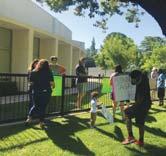
reading stories, doing activities, singing songs and having fun as families.
Cornerstone Community Church, Harvey, N.D., invited families to participate at home in BOLT vacation Bible school, designed to bring the fun and faith-formation of vacation Bible school to families’ homes. The event included minimal preparation, easy-to-follow instructions and a video leading families step-by-step through each day.
The Cross Training high school youth group at Zoar MB Church, Inman, Kan., held a Serve Week July 6-10. Projects in the community included house painting and yard
cleanup, with an overnight campout at a nearby lake to cap the weekend. Members of the congregation supplied meals, snacks and tools.
Prodigal Church, Fresno, Calif., participated in a food distribution by giving away 800 boxes of food at Ahwahnee Middle School July 10.
Lighthouse Church, Denver, Colo., partnered with Community Ministry in a Back to School Drive. Members of the congregation were encouraged to claim one of 25 empty backpacks and fill with supplies from a provided list for students.
Local Church
Senior Pastor: Fairview MB Church is accepting applications for a senior pastor position. Fairview is in NW Oklahoma with a population of 2,700. Pastor responsibilities include serving as the spiritual leader of the church, planning and coordinating worship services, cooperating with district and national denominational leaders, serving as head of pastoral staff, performing weddings and conducting funerals. If you are interested, please send resume to jbrob1676@gmail.com
Lead Pastor: North Oak Community Church in Hays, Kan., a church of over 350, is excitedly seeking its next lead pastor. We desire a pastor who can guide a multi-staff ministry team partnering with the elders and members to accomplish the mission to which God has called us. If you have interest or know of someone who may be interested, please email a resume and cover letter to pastorsearch@northoak.net. Additional information is available online at www.northoak.net. Priority consideration given to applications received by Oct. 1, 2020.
updated the file description for Schmidt’s personal papers collection at (4) the Center for MB Studies website, http://cmbs.mennonitebrethren.ca/personal_papers/schmidtjohn-m-1918-2008/.
Plus, I scanned 16 additional MB history books to which the Historical Commission has rights, uploading them to (5) the Internet Archive website, bringing the total to more than 90 e-books readable online at https://mbhistory.org/books/.
That makes five different websites—accessible to researchers anywhere with internet service! Looking for a baptism photo, an obituary of a loved one or a book, magazine article or church decision on some theological issue? There are online research resources available to help you with your quest. This is usable history, the best kind!◗
Mountain View Church, Fresno, Calif., collected baby bottles filled with change for the Pregnancy Care Center, July 19.
Community Bible Church, Olathe, Kan., collected diapers, wipes and games for teen parents in support of Youth For Christ KC’s Parent Life Ministry. The church supported Mission Southside’s Backsnack Program by contributing food items.
Faith Bible Church, Omaha, Neb., wrote letters of encouragement to government leaders and people in the church neighborhood, June 16.
Worship Leader: Rosedale Bible Church, Bakersfield, Calif., is searching for a worship leader to work closely with the pastors to create worship services and develop worship teams that help lead the congregation in the power of the Spirit to see and savor the greatness of God in Jesus Christ. Fostering dynamic congregational worship and singing the best of the old and the best of the new is a key priority for our church. For additional information and inquiries, email Connie Penner, lorrielee63@yahoo.com
Statement of ownership, management and circulation
Publication title: Christian Leader. Publication number: 0009-5419. Filing date: 08/11/20. Issue frequency: bimonthly. Number of issues published annually: 6. Annual subscription price: $10. Complete mailing address of known office of publication: PO Box 155, Hillsboro, KS 67063. Complete mailing address of headquarters or general business office of publisher: U.S. Conference of MB Churches, PO Box 20200, Wichita, KS 67208-1200. Full names and complete mailing address of publisher, editor and managing editor: Publisher: U.S. Conference of MB Churches, PO Box 20200, Wichita, KS 67207-1200; Editor: Connie Faber, PO Box 155, Hillsboro, KS 67063. Managing editor: none. Owner: U.S. Conference of MB Churches, PO Box 20200, Wichita, KS 67207-1200. Known bondholders, mortgagees and other security holders owning or holding 1% or more of total amount of bonds, mortgages or other securities: none. Tax status has not changed during proceeding 12 months. Issue date for circulation data: June/July 2020. Extent and nature of circulation: the first number represents the average number of copies of each issue during the proceeding 12 months, the number in parentheses is the number of copies of a single issue (June/July 2020) published nearest the filing date. (a) Total number of copies: 8,334 (8,292 (b) Paid circulation: 1) mailed outside-county paid subscriptions: 7,177(7,138) 2) mailed in-county subscriptions: 476 (477) 3) paid distribution outside the mails: 0 (0) 4) paid distribution by other cases of mail: 258 (256) (c) Total paid distribution: 7,911 (7,871) (d) Free or nominal rate distribution. Outside county copies: 0 (0) In-county copies: 0 (0), copies mailed at other classes through USPS: 273 (271); Nonrequested copies distributed outside the mail: 0 (0). (e) Total free or nominal rate: 273 (271) (f) Total distribution: 8184 (8,142) (g) Copies not distributed: 150 (150) (h) Total: 8,334 (8,292) (i)Percent paid and/or requested circulation: 96.66% (96.67%). I certify that all information furnished is true and complete. I understand that anyone who furnishes false or misleading information on this form or who omits material or information requested on the form may be subject to criminal sanctions and/or civil sanctions. Signed:ConnieFaber
Think about how you would answer this question
Why are we doing all of this? Why do we have Mennonite Brethren churches? Why invest to develop leaders or provide training programs that are about helping leaders do what they do better? Why have MB schools?
Why do we keep paying for church buildings, paying monthly utilities and upkeep? Why do we hire pastors and ministry leaders? Why do we have a USMB national conference and staff? Why conferences and conventions? Why do we supply district ministers and district operations and ministries?
Why do we support Multiply’s local and global mission or help fund ICOMB (the International Community of Mennonite Brethren) and the Historical Commission? Why bother with USMB Youth or even assisting/connecting with other Anabaptist agencies?
Why hassle with watching online services if we can’t gather face-to-face? Why provide food to families in need during the
pandemic? Why children’s programs or VBS? Why write articles and books and responses to theological questions and concerns? Why tithe?
Why invest funds with MB Foundation so they can make ministry loans? Why do we have a National Strategy Team? Why develop a new church planting plan? Why worry about what other MB churches are doing?
Why bother to take an elderly neighbor to a doctor’s appointment? Why sing songs, hymns and spiritual songs? Why attend church to begin with? Why spend time reading the Bible? Why join a small group with other people? Why take cookies to the neighbors next door and thus begin a connection with them? Why pray for people? Why care about other people? Why?
I pray and hope we know why. How would you answer for yourself? Write your answer below.◗
Why do we do all this? Share your answer here.

Don Morris began serving as the USMB national director Aug. 1, 2016. Prior to accepting this position, Morris served as the USMB interim executive director for two years and as the director of Mission USA beginning in 2004. He and his wife, Janna, live in Edmond, Okla., where they attend Cross Timbers Church.
